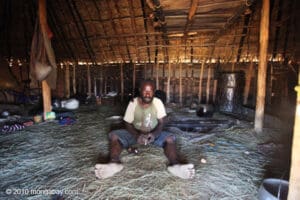
As seen on Mongabay
Indonesia’s indigenous population has suffered a long history of human rights violations says a report to be released by the country’s National Commission on Human Rights in May.
“We are finding violations of the right to property, to live, to a fair trial, to feel safe, to an adequate standard of living,” said Sandra Moniaga, a commissioner and researcher involved in the first National Inquiry on the Violations of Indigenous Peoples Rights within Forest Zones. Moniaga spoke at a press briefing in Jakarta last week organized by the Indigenous Peoples’ Alliance of The Archipelago (AMAN).
The report will compile the findings of several months of inquires held in Sumatra, Java, Bali-Nusa, Sulawesi, Kalimantan, Maluku and Papua. During the proceedings, investigators looked into the root causes of indigenous human rights violations by examining around 40 cases reported to the commission.
“We are seeing a lack of legal certainty for the recognition of indigenous peoples in Indonesia,” said Moniaga. “There is no effort being made to designate the boundaries of their territories on official maps and documents; they face legal obstacles in their efforts to claim legitimacy; indigenous women face discrimination on multiple levels; government agencies (including the police) and the military have been working for the private sector, and not for the indigenous communities, and there is no ministerial level institution with the mandate to resolve the prolonged land conflicts.”
Abdon Nababan, Secretary General of AMAN, hopes the report will compel Indonesia’s new president to take concrete steps toward ensuring justice for the country’s indigenous population. AMAN represents 15 million people belonging to 2,244 indigenous communities throughout Indonesia—a number of whom have been arrested for resisting efforts to block their community’s access to lands they have depended upon for generations.
“Indigenous peoples are very easy to criminalize,” Nababan said. “They often do not have legal protections, or they don’t know their rights. This is an unacceptable situation.”
AMAN is calling for a presidential task force to re-examine over 150 cases of indigenous leaders who have been incarcerated unfairly while acting in defense of their constitutional rights. Although the constitutional court ruled in 2013 that customary use forests should not be classified as state forests, local officials often ignore the ruling and issue conflicting development permits.
Original article – Indonesia’s indigenous people still suffer human rights violations, says report
